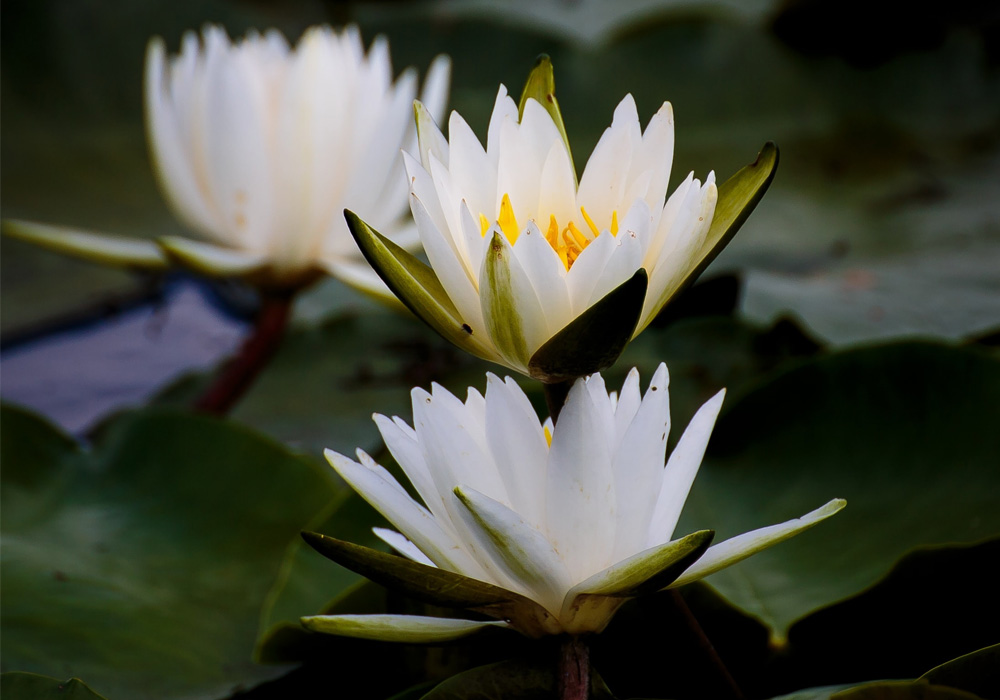“You know when people say, ‘Cancer has been a gift in my life?’” my friend Ann said. We were sitting on her front steps, looking out at the Esopus River and Mount Tremper behind it, lush with summer green. The sun glinted off the surface of the water, setting it dancing. I nodded in response to Ann’s question, fully expecting she was going to echo the sentiment.
“That’s bull…!” she said, staring straight ahead. “I wouldn’t wish this on anyone, and I certainly don’t think it’s a gift. I would much rather be healthy.”
I was a bit taken aback, but also grateful for Ann’s bluntness. She wasn’t going to pretend to be the noble Buddhist during this very painful time. She was going to call it as she felt it, the way she always had. It sucks to be sick. And it really sucks to be dying. Don’t let anyone tell you otherwise.
Who or what is catching us when we take refuge?
Now, sitting in my New York City apartment, where I’ve been confined in observance of the “stay at home” order, I think of Ann and wonder what she’d say about the coronavirus pandemic. Not a gift, most likely. Who would wish this on anyone — let alone the whole world? Yet here it is for all of us to reckon with, and as I read the news and feel my reactions to all the facts and figures so easily thrown about, the increasingly dire headlines, I think of Ann and am reminded, once again, of the power of words and meanings.
“Look at your words, ‘shelter in place,’ you know where that came from?” Cuomo said in a press conference soon after De Blasio warned New Yorkers of the possibility a “shelter in place” order for the city. The phrase, which according to an article in Mother Jones first appeared in a 1957 House subcommittee hearing, referred to civil defense measures that dictated citizens to take refuge from immediate threats like chemical spills, nuclear bombs, tornadoes, and active shooters. Upon hearing the order, you were supposed to stay where you were and not move from that place until told it was safe to do so.
“What you say and how you communicate is very important,” said the governor in reply to De Blasio’s statement. He instead urged New Yorkers to stay at home as much as possible, and only go out for the essentials.
Words matter, and what we do with them matters even more. As a lover of words, I’ve been wondering whether there are other, more fruitful ways to think about “sheltering in place” — ways that belie our war-laden, crisis-driven uses of the phrase. As a practitioner, the natural connection I’ve made is to the word “refuge.” In Buddhism, we take refuge in the Three Treasures of Buddha, Dharma, and Sangha. At a time like this, what does that actually mean?
My first teacher, John Daido Loori Roshi, used to speak of taking refuge as abiding in complete trust — a trust devoid of safety nets. He said that the Japanese word for “taking refuge,” comes from the term ki-e, where ki, means “to unreservedly throw oneself into” and e is “to rely upon.” Then Roshi would invoke the image of a child throwing themselves unreservedly into a parent’s arms, completely trusting that the parent would catch them.
Normally we think of refuge as shelter, as a haven in which to take cover from danger, from the elements, from one another. Yet ki-e is a different kind of refuge altogether. It calls for courage and trust and vulnerability — an openness that I believe comes from the recognition that the universe is an infinitely fragile place. That we are infinitely fragile creatures. Yet to know this is terrifying, so in response some of us defend ourselves with hubris or bravado. Some of us retreat and shut down. Some of us recognize that the only way to deal with this fragility is to face it; it’s to hold it with a great deal of respect but also a kind of wonder. Who are we, really? Ki-e asks us to put ourselves out there, as it were, to be completely undefended, and there find protection.
Many years ago, my family had a dachshund named Igor who would climb onto my mother’s bed and throw himself into my arms, exactly as Roshi described. Crouching a few feet from the bed I’d watch as our Wiener dog leapt into space, stubby legs and floppy ears flying, not an ounce of hesitation in his little body. He seemed to know, with every fiber of his being, that I’d always catch him.
But if, as my teacher said, there are no safety nets, then who or what is catching us when we take refuge — when we shelter — in the Three Treasures?
The Vajrayana master Dilgo Khyentse Rinpoche once said, “The essence of taking refuge is to have complete confidence in the Three Treasures, regardless of life’s circumstances, good or bad.” Taking refuge, we don’t make deals with the Buddha, Dharma, and Sangha. We don’t wait for better times, a clearer head, a calmer heart. We don’t anticipate life getting back to “normal.” We practice, not in spite of the circumstances, but with them.
Words matter, and also what we do with them.
Every morning, to counter the anxiety that reading the news invariably causes me, I spend some time offering gratitude for all the many things I still have. Health — my own and my loved ones’. A roof over my head. Good company. Plentiful food. Work. Sun filtering through my window as I write. The sight of a blooming magnolia. Spring rain. My early morning runs. Books. Hot water. Practice. Practice. Practice.
It’s a small thing, this daily liturgy, and hardly innovative. Yet as I make my way through an ever-growing list of gifts that necessarily includes my teachers, their teachings, and the many good and noble friends who’ve accompanied me along the path, I feel my body release a tiny bit, my heart dilate, my mind unclench.
And while this simple offering does not in any way ease the suffering of those who’ve lost and are losing so much as a result of the virus, it reminds me that that I’m not bereft. That at this moment, I have everything I need and therefore the opportunity to offer it.
Words matter, and also what we do with them.
“Truth, in things, is their reality,” Thomas Merton said in No Man Is an Island. “In our minds, it is the conformity of our understanding with the things known. In our words, it is the conformity of our words to what we think. In our conduct, it is the conformity of our acts to what we are supposed to be.” I would humbly change that last line to read, “It’s the conformity of our acts to what we truly are.”
On one hand, we’re highly susceptible, perhaps more than a little frightened, utterly ordinary human beings. On the other, we’re resilient, inventive, courageous buddhas. I think of the millions of doctors and nurses and health aid workers and scientists and researchers giving all the hours of their days to fight the virus. The women who are sewing masks by the thousands to offer the gift of protection. The volunteers at testing stations. The people stocking shelves, delivering packages, making food for health workers, for children, for the elderly. These are the people on the front lines, but behind whom there’s legions more. Professors, school teachers, ballet instructors, therapists, journalists, artists — all working remotely. Priests, ministers, imams and rabbis leading communities virtually. Parents parenting their children intimately, constantly. In short, we’re all going about the business of living and finding new ways to do it in a world that’s changing so quickly. Having lost the ground under our feet, we turn toward one another to be each other’s ground. Buddhist or not, this is the wisdom of the Buddha Treasure. The clarity of the Dharma Treasure. The harmony of the Sangha Treasure. This is “sheltering in place,” where place is everywhere.
No one would have wished for this pandemic. No one would argue it’s a “gift” we could all do without. Yet, being faced with a reality we cannot deny, we have the opportunity to see that the groundlessness it has made so stark is in fact the way things always are. From a Buddhist perspective, change and disruption are a given, although here they’re magnified to a degree that’s impossible to ignore—which makes it that much more pressing to also find refuge within. I think this is what Daido Roshi meant when he said there are no safety nets. The Buddha doesn’t catch us. Our teacher doesn’t catch us. We catch ourselves. That too, is sheltering in place, where place is here and now. And because on occasion we do miss, we also catch each other.
When my friend Ann was bedridden and months away from death, I stopped by again for a visit. I hadn’t seen her in a couple of weeks and was shocked at how delicate she seemed.
I entered the room quietly, and approaching her bed, leaned forward to hug her.
“Aggggghh, aaaghhhh, aggggh!” Ann croaked. “You’re stepping on my oxygen line!”
I jumped back as if electrocuted and an instant later heard her laughter. “I’m joking,” she said, and opened her arms wide.
“Oh,” I mumbled with a weak laugh. “You scared me.” I held her lightly, hoping she couldn’t feel my heart hammering in my chest.
“I’m sorry,” she said. Then she looked at me. “This is scary, isn’t it?”
I nodded without saying anything.
“Yes, it is,” she said thoughtfully. “But you know, there’s the other too.”
“The other what?” I asked, when she didn’t explain.
“Well, you do have to wonder what happens next,” she said, and smiled. “There’s so many possibilities — which is exciting, if you think about it. At least, the scientist in me finds it exciting. Yes,” she nodded. “I’d like to see what happens next.”

